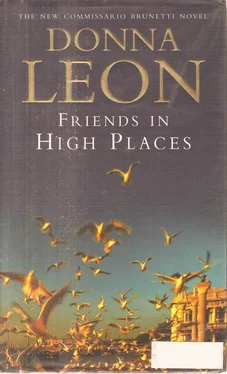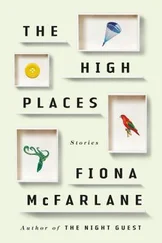‘Some?’ Brunetti asked, his voice deliberately free of all scepticism.
‘Some,’ Patta repeated with a finality that put an end to discussion.
‘Have you seen today’s paper, sir?’ Brunetti asked, surprising himself as much as his superior with the question.
‘No,’ Patta answered, then added, Brunetti thought gratuitously, ‘I’ve been too busy since I got here to have time to read the paper.’
‘Four teenagers were involved in an accident near Treviso last night. Coming back from a disco, their car went off the road and into a tree. One boy’s dead, a university student, and the others are badly injured.’ Brunetti stopped, an entirely diplomatic pause.
‘No, I haven’t seen it.’ Patta said. He too paused for a moment, but this was the pause of an artillery commander, deciding how heavy to make the next salvo. ‘Why do you mention it?’
‘He’s dead, sir, one of the passengers. The paper said their car was going about a hundred and twenty kilometres an hour when they hit the tree.’
‘That’s certainly unfortunate, Commissario,’ Patta observed with much the same involvement one might devote to a remark about the decline of the banded nuthatch. He returned his attention to his desk, turned the paper over and studied it, then glanced up at Brunetti. ‘If it happened in Treviso, then I imagine the case belongs to them, not to us.’ He looked studiedly down at the paper, read a few lines, then looked back up at Brunetti, as if surprised to see him still there. ‘Was that all, Commissario?’ he asked.
‘Yes, sir. That’s all.’
Outside the office, Brunetti found that his heart was pounding so hard he had to lean against the wall, glad that Signorina Elettra was not at her desk. He stood still until his breathing quieted, and when he was again in control of himself, he went back up to his office.
He did what he knew he had to do: routine would direct his mind away from the rage he felt toward Patta. He pushed papers around on his desk until he found the number that had been in Rossi’s wallet. He dialled the Ferrara number. This time, the phone was picked up on the third ring. ‘Gavini and Cappelli,’ a woman’s voice answered.
‘Good morning, Signora. This is Commissario Guido Brunetti of the Venice police.’
‘One moment, please,’ she said, as though she’d been waiting for his call. ‘I’ll put you through.’
The line went dead as she transferred the call, then a man’s voice said, ‘Gavini. I’m glad someone finally answered our call. I hope you can tell us something.’ The voice was deep and rich and gave every sign of eagerness to hear Brunetti’s news, whatever it should be.
It took a moment for Brunetti to respond. ‘I’m afraid you have the advantage of me, Signor Gavini. I haven’t received any message from you.’ When Gavini said nothing, he added, ‘But I’d like to know what you’re expecting the Venice police to call you about.’
‘About Sandro,’ Gavini said. ‘I called there after his death. His wife told me he’d said he’d found someone in Venice who might be willing to talk.’
Brunetti was on the point of interrupting him when Gavini paused and asked, ‘Are you sure no one there got my message?’
‘I don’t know, Signore. Whom did you speak to?’
‘I spoke to one of the officers; I don’t remember his name.’
‘And could you repeat to me what you told him?’ Brunetti asked, pulling a sheet of paper towards him.
‘I told you: I called after Sandro’s death,’ Gavini said, and then asked, ‘Do you know about that?’
‘No.’
‘Sandro Cappelli,’ Gavini said, as if the name would explain everything. It did strike a faint chord in Brunetti’s memory: he couldn’t remember why he knew the name, but he was sure that whatever he knew of it was bad. ‘He was my partner in the practice here,’ Gavini added.
‘What sort of practice, Signor Gavini?’
‘Legal. We’re lawyers. Don’t you know anything about this?’ For the first time, a note of exasperation slipped into his voice, the note that inevitably came into the voice of anyone who spent enough time dealing on the phone with an unresponsive bureaucracy.
Gavini’s saying that they were lawyers jogged Brunetti’s memory. He remembered Cappelli’s murder, almost a month ago. ‘Yes, I know the name. He was shot, wasn’t he?’
‘Standing at the window of his office, a client sitting behind him, at eleven in the morning. Someone shot him through the window with a hunting rifle.’ As he rapped out the details of his partner’s death, Gavini’s voice took on the staccato rhythm of real anger.
Brunetti had read the newspaper accounts of the murder, but he knew no facts. ‘Is there a suspect?’ he asked.
‘Of course not,’ Gavini shot back, making no attempt to stop his anger from boiling over. ‘But we all know who did it.’
Brunetti waited for Gavini to spell it out for him. ‘The moneylenders. Sandro’d been after them for years. He had four cases running against them when he died.’
The policeman in Brunetti caused him to ask, ‘Is there any evidence of this, Signor Gavini?’
‘Of course not,’ the lawyer all but spat down the line. ‘They sent someone, paid someone and sent him to do it. It was a contract killing: the shot came from the roof of a building on the opposite side of the street. Even the police here said it had to be a contract killing; who else would want to murder him?’
Brunetti had too little information to be able to answer questions about Cappelli’s death, even rhetorical ones, and so he said, ‘I ask you to excuse my ignorance about your partner’s death and the people responsible, Signor Gavini. I was calling you about something entirely different, but after what you’ve said, I wonder if it is so different.’
‘What do you mean?’ Gavini asked. Though the words were abrupt, his voice was curious, interested.
‘I’m calling about a death we’ve had here in Venice, a death that looks accidental but might not be.’ He waited for Gavini’s questions, but none came, and so he continued. ‘A man fell from scaffolding here, and died. He worked in the Ufficio Catasto and had a phone number in his wallet when he died, but without any city code. This is one of the numbers it might have been.’
‘What was his name?’ Gavini asked.
‘Franco Rossi.’ Brunetti allowed him a moment for reflection or memory, then asked, ‘Does it mean anything to you?’
‘No, it doesn’t.’
‘Is there any way you could find out if it meant something to your colleague?’
Gavini was a long time in answering. ‘Do you have his number? I could check the phone logs,’ he suggested.
‘One moment,’ Brunetti said and bent to pull open his bottom drawer. From it, he took the phone book and checked through the listings for Rossi: there were seven columns of them, and about a dozen of those were Francos. He found the address and read the phone number to Gavini, then asked him to wait while he flipped to the pages for the Comune of Venice and found the number for the Ufficio Catasto. If Rossi had been rash enough to call the police from his telefonino, he might easily have called the lawyer from his office or received calls there.
‘It will take me a while to check the logs,’ Gavini said. ‘I’ve got someone waiting to see me. But as soon as he’s gone, I’ll call you back.’
‘Perhaps you could ask your secretary to do it for you.’
Gavini’s voice suddenly took on an odd note of excessive formality, almost of caution. ‘No, I think I’d prefer to do this myself.’
Brunetti said that he’d wait for Gavini’s call, gave his direct number, and the two men hung up.
A phone that had been disconnected months ago, an old woman who knew no one named Franco Rossi, a car rental agency with no such client, but now the partner of a lawyer whose death had been as violent as Rossi’s: Brunetti well knew the time that could be wasted in following false scents and chasing down misleading trails, but this had the right feel to it, however uncertain he might be of what it was or where it might be leading.
Читать дальше











